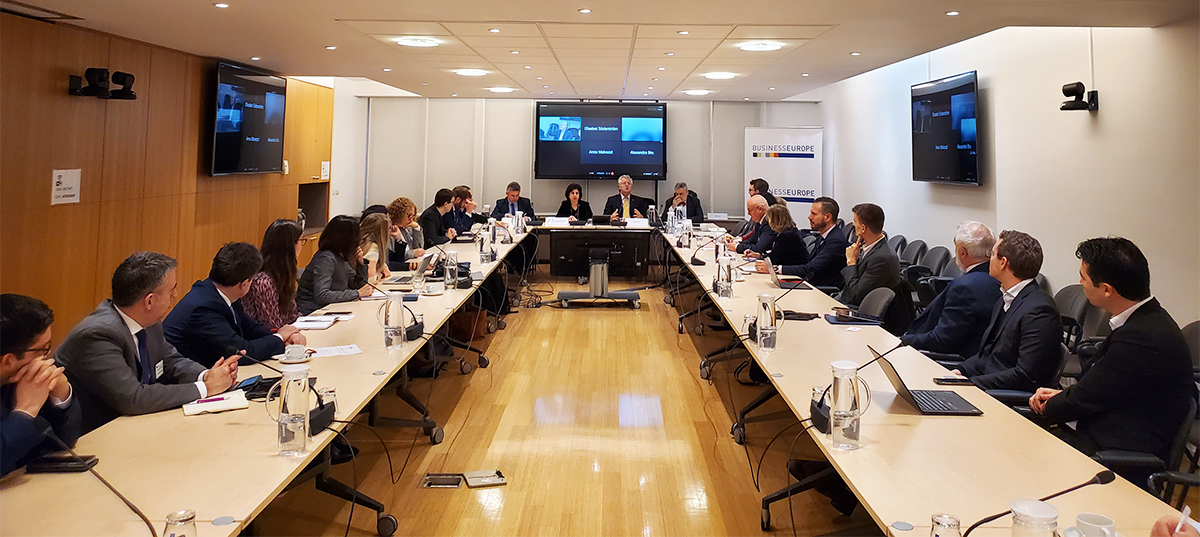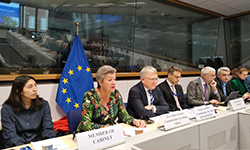BusinessEurope Headlines No. 2023-01
Doing business in China: exchange of views with entrepreneurs on the ground

The event “European business in China post-2022 – The view from the ground”, jointly organised by BusinessEurope, the European Union Chamber of Commerce in China (EUCCC) and the EU-China Business Association (EUCBA) on 12 January was a valuable opportunity to hear first-hand insights from China-based representatives of European business. The event was held on the occasion of the first visit of an EUCCC delegation in Brussels since the beginning of the COVID-19 pandemic. In her welcome remarks, Luisa Santos, Deputy Director General of BusinessEurope, highlighted that “in view of an ever-growing list of risks for companies doing business in China, stemming from geopolitical developments, a more politicised business environment, and emerging legislation both within and outside China, it is very valuable for all of us to hear these first-hand insights and impressions”. She added that in an ever more complex geopolitical environment, the EU will need to strike the right balance between assertiveness and cooperation in its relations with China. “The European business community has a crucial role to play in this process”, Santos said. Her intervention was followed by a presentation on the current business environment in China by EUCCC President Jörg Wuttke. Afterwards, representatives of various EUCCC working groups shared insights from the energy, pharma, financial services, and maritime manufacturing sectors. Kurt Vandeputte, Vice-Chairman of EUCBA, concluded the event.
Contact: Benedikt Wiedenhofer
Calling on the EU to make 2023 the year of new trade agreements
 Many European companies are fighting for their very survival. Soaring energy bills, high inflation, disrupted supply chains, diminishing consumer demand are too many and too serious challenges to face all at once. There is no single silver bullet to solve all these numerous issues. We appreciate the efforts from the European Commission and European Council to address these challenges and find the best tools to support competitiveness and maintain investments in Europe. We believe that increasing diversification through new free-trade agreements would be one of the key actions to improve the situation and address many of the current challenges. Read our letter to the President of the European Commission, Ursula von der Leyen, and the President of the European Council, Charles Michel.
Many European companies are fighting for their very survival. Soaring energy bills, high inflation, disrupted supply chains, diminishing consumer demand are too many and too serious challenges to face all at once. There is no single silver bullet to solve all these numerous issues. We appreciate the efforts from the European Commission and European Council to address these challenges and find the best tools to support competitiveness and maintain investments in Europe. We believe that increasing diversification through new free-trade agreements would be one of the key actions to improve the situation and address many of the current challenges. Read our letter to the President of the European Commission, Ursula von der Leyen, and the President of the European Council, Charles Michel.
![]() Contact: Eleonora Catella
Contact: Eleonora Catella
Launch of labour migration platform: a positive step for EU migration policy
 2023 is an important year for the EU to make a step towards a well-designed coordinated EU policy framework for economic migration. A key challenge is for the EU to become more attractive to the skills profiles that are high in demand on our labour markets. Another one is to change the current situation whereby third-country nationals’ employment participation is much lower compared to the EU’s domestic workforce. Progressing on both accounts is crucial to improve the political acceptance of migration across Europe. These aspects, in combination, are especially important in view of wide-spread labour and skills shortages across the EU. The proposed EU talent pool is therefore an important initiative of the European Commission, an initiative that is clearly in Europe’s interest to help better match our skills needs that are presently unmet through better informed, targeted and coordinated economic migration policies at EU and national level. These were the main messages given by Maxime Cerutti, BusinessEurope Director of Social Affairs, during the first meeting of the new Labour Migration Platform on 10 January. This platform has been created to improve labour migration governance and to help provide the impetus for reforms. The meeting was opened by the European Commissioner for Home Affairs, Ylva Johansson, and the Commissioner for Jobs and Social Rights, Nicolas Schmit. The platform brings together Member State representatives from home affairs and employment ministries as well as the European economic and social partners.
2023 is an important year for the EU to make a step towards a well-designed coordinated EU policy framework for economic migration. A key challenge is for the EU to become more attractive to the skills profiles that are high in demand on our labour markets. Another one is to change the current situation whereby third-country nationals’ employment participation is much lower compared to the EU’s domestic workforce. Progressing on both accounts is crucial to improve the political acceptance of migration across Europe. These aspects, in combination, are especially important in view of wide-spread labour and skills shortages across the EU. The proposed EU talent pool is therefore an important initiative of the European Commission, an initiative that is clearly in Europe’s interest to help better match our skills needs that are presently unmet through better informed, targeted and coordinated economic migration policies at EU and national level. These were the main messages given by Maxime Cerutti, BusinessEurope Director of Social Affairs, during the first meeting of the new Labour Migration Platform on 10 January. This platform has been created to improve labour migration governance and to help provide the impetus for reforms. The meeting was opened by the European Commissioner for Home Affairs, Ylva Johansson, and the Commissioner for Jobs and Social Rights, Nicolas Schmit. The platform brings together Member State representatives from home affairs and employment ministries as well as the European economic and social partners.
![]() Contact: Robert Plummer
Contact: Robert Plummer
Photo copyright: European Commission 2023
European Critical Materials Act: key for EU competitiveness
 At a time when access to critical raw materials is crucial for Europe's competitiveness and for business to develop sustainable economic activities, the EU is strongly depending on third countries. BusinessEurope overall supports the principles inspiring the European Critical Raw Materials Act, which is expected to be published in March and aims at securing a sustainable supply of critical raw materials to support the green and digital transitions as well as defence capacities. We believe that this initiative should focus on broad measures to promote increased sustainable extraction and recycling within Europe and to enable business-driven diversification of sourcing from third countries. We discourage undue increases in administrative burden and interventions in the functioning of markets. Coordination, coherence and consistency with other existing policies is crucial and needs to be guaranteed. Administrative burdens, costs and benefits shall be assessed, including direct and indirect impact on companies and SMEs in particular. See our comments.
At a time when access to critical raw materials is crucial for Europe's competitiveness and for business to develop sustainable economic activities, the EU is strongly depending on third countries. BusinessEurope overall supports the principles inspiring the European Critical Raw Materials Act, which is expected to be published in March and aims at securing a sustainable supply of critical raw materials to support the green and digital transitions as well as defence capacities. We believe that this initiative should focus on broad measures to promote increased sustainable extraction and recycling within Europe and to enable business-driven diversification of sourcing from third countries. We discourage undue increases in administrative burden and interventions in the functioning of markets. Coordination, coherence and consistency with other existing policies is crucial and needs to be guaranteed. Administrative burdens, costs and benefits shall be assessed, including direct and indirect impact on companies and SMEs in particular. See our comments.
![]() Contact: Daniele Olivieri
Contact: Daniele Olivieri
European binding standards for equality bodies should always respect the autonomy of social partners
 BusinessEurope recognises the important role of equality bodies to promote equal opportunities in the workplace and fight against discrimination on the European labour markets. A key challenge ahead is for equality bodies to co-operate with social partners in a constructive and trustworthy manner, to ensure that diversity, non-discrimination and inclusion policies are effectively implemented in the workplace in a way that is manageable for companies. In this light, we broadly welcome the main objective of the Equality Package to strengthen the independence and effectiveness of equality bodies if this is actually done as part of a trust-based relationship between social partners and equality bodies. This means that equality bodies should always respect the autonomy of social partners. Moreover, broadening the competences of equality bodies should always be done with respect to the role of labour inspectorates and national courts. Equality bodies should therefore not have litigation powers and/or legally binding and enforceable decision-making powers. These were the key messages of Isaline Ossieur, Social Affairs Adviser at BusinessEurope, during the European Economic and Social Committee public hearing on "Strengthening the role and independence of equality bodies", held on 16 January.
BusinessEurope recognises the important role of equality bodies to promote equal opportunities in the workplace and fight against discrimination on the European labour markets. A key challenge ahead is for equality bodies to co-operate with social partners in a constructive and trustworthy manner, to ensure that diversity, non-discrimination and inclusion policies are effectively implemented in the workplace in a way that is manageable for companies. In this light, we broadly welcome the main objective of the Equality Package to strengthen the independence and effectiveness of equality bodies if this is actually done as part of a trust-based relationship between social partners and equality bodies. This means that equality bodies should always respect the autonomy of social partners. Moreover, broadening the competences of equality bodies should always be done with respect to the role of labour inspectorates and national courts. Equality bodies should therefore not have litigation powers and/or legally binding and enforceable decision-making powers. These were the key messages of Isaline Ossieur, Social Affairs Adviser at BusinessEurope, during the European Economic and Social Committee public hearing on "Strengthening the role and independence of equality bodies", held on 16 January.
Contact: Isaline Ossieur
Calendar 
- 8 February: BusinessEurope’s SME Roadshow. First stop Helsinki. Are we doing enough for European SMEs?
Not yet a subscriber? Register here.
Reminder: please have a look at our privacy policy